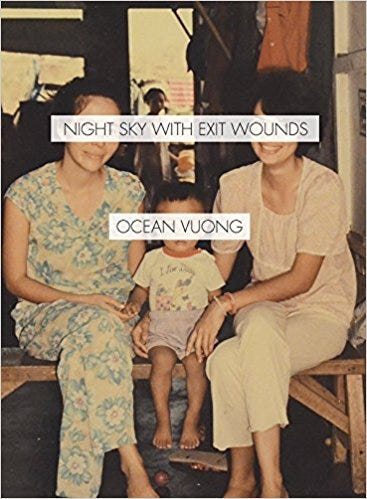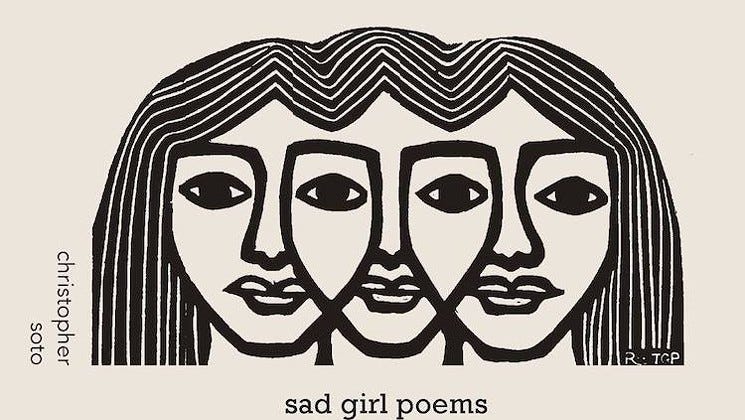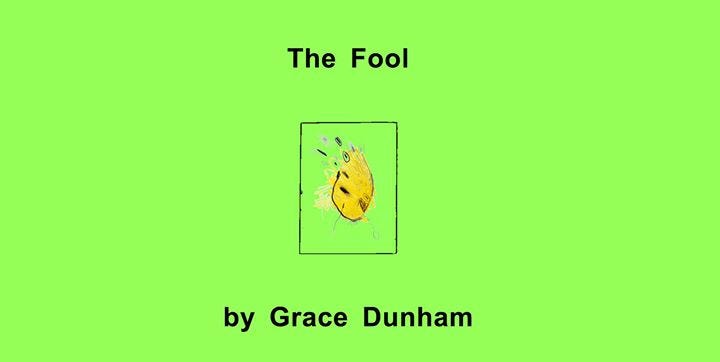Queer poets are reinventing the world, one word at a time. They are imagining new possibilities in our urgent times, giving us new ways of being and becoming. Under their magic, a poetry line is a life line.
Here is a round-up of some of my favorite poetry books that came out last year (no apologies for fabulous puns) from gay, lesbian, nonbinary, transgender, and otherwise queer authors. Savor them. Worship them. Snatch their books from your local bookseller.
- Night Sky with Exit Wounds — Ocean Vuong

Ocean Vuong makes language explode like no one else. This poetry collection is nothing short of luminous: once I read it through, I immediately began what became a cycle of rereading. His themes are far-reaching, from family to war, from masculinity to the limits of desire, and, most of all, a pervading loneliness. As if writing on the edge of disappearance, Vuong frequently invokes images of drowning and detonations. Also notable is Vuong’s surprising lineation choices, filled with subtle reversals. Consider this gem section from “On Earth We’re Briefly Gorgeous,” gradually arching towards (tempered) forgiveness: “Say amen. Say amend. / Say yes. Say yes // Anyway.”
Less reproducible here is Vuong’s instinct for formatting; indentations and columns set many of the poems in flight across the page. For example, in the longish “Ode to Masturbation,” short lines jut in and out, Niedecker-esque, in an erotic rubbing motion. Language touches and pleasures itself on the page, holding itself when nobody else will — a fatalist dance of self-preservation. Tone and self-address link this ode with a highlight later in the collection, “Someday I’ll Love Ocean Vuong,” which clings to the indefinite future to deliver a series of comforting promises and self-reminders:
Ocean. Ocean —
get up. The most beautiful part of your body
is where it’s headed. & remember,
loneliness is still time spent
with the world.
I need not say more — Vuong speaks for himself.
2. Sad Girl Poems by Christopher Soto (aka Loma)

A co-founder of Undocupoets and editor for Nepantla: A Journal Dedicated to Queer Poets of Color, Christopher Soto is shaking up the poetry publishing world by making space for QTPOC voices. Their own poetic voice infuses a punk zine aesthetic into confessional lyric, politicizing the personal with the intent of mobilizing readers to action. Most of the chapbook dwells on Soto’s grief after the death of their first love, Rory. You can’t look away from their pain, punctuated with lacerating slashes:
My body was
A match // his memory was a flame.
My tears were gasoline. Bonfires were scattered along the coast &
Fires pawed the sky // like hungry dogs.
Can poetry alleviate grief? Lorde knows (to echo a Soto pun), but I appreciate Soto’s brazen honesty about their own frustration with poetry: “This is such a useless fucking poem. / [He’s not coming back].” Their poems break from genre conventions, intentionally messing up a villanelle, for instance, in order to let in the raw sloppiness of life. Characteristic of this disarray is Soto’s frequent slippage into brackets. [Arms attempting to caress life against the void of death, yet holding out weakly, limply memorializing — not unlike in Virginia Woolf’s To the Lighthouse.] There is a pricelessness to Soto’s sadness, and the reader cannot help but to empathize with them, to also feel “[broken like a wishbone]”.
3. The Fool — Grace Dunham

“All I ever wanted/ Was to be myself” declares non-binary writer and activist Grace Dunham — yes, Lena’s sibling — in this arrestingly inventive chapbook. They write about gender binaries, prison abolition, and death in radically accessible prose and verse that verges at times on singsong nursery rhyme. In web-book form, it’s all set against a key lime green background.
Here, simplicity is a virtue: Dunham parses through emotional confusion and trauma with striking clarity, but without compromising nuance. In one poem about prison abolition, Dunham outright declares, “I’m using simple language because this is a very simple truth. I’m wielding cliches of freedom, happiness, and pleasure because joy is often quotidian, and it is being taken.” Every word is earnest, vulnerable, and pleading. Dunham seeks doors out of binaries and prisons, and they want you to, too. Playful cadences and rhymes, usually more characteristic of kindergarten story time, become acts of queer world-making, bravely dreaming up visions of less oppressive worlds:
But since we are here
Having sex in this bed
As long as we’re here
While others are dead
Tell me your wish
Show me your vision
A world without AIDS
A world without prison
(Curse of Cherifa Press, 2016.)
4. Femme in Public — Alok Vaid-Menon

Alok Vaid-Menon writes poems that detonate from heartbreak caused by structural violence:
I HAVE WRITTEN THE SAME POEM MY ENTIRE LIFE. IT BEGINS WITH “BODY” AND IT ENDS WITH “I’M SORRY.”
Their chapbook is haunted by the fraught terms of survival for transgender and nonbinary POC. How to notate the dysphoria of diaspora or transcribe loneliness, fear, shame, desire? Many of Vaid-Menon’s poems/mantras/ prayers are stylized in urgent all-caps or confessed in all lower-case; all are oral and demand to be spoken and heard aloud (unsurprising, considering their history in former spoken word duo DarkMatter).
Vaid-Menon’s poems are deeply empathetic, bearing witness to queer shame, loneliness, and anger. One highlight is the poem “funeral,” which reflects on grief and connection amidst public transportation delays following a stranger’s suicide. As one passenger breaks the silence to complain of the inconvenience, Vaid-Menon’s impulse is “to hug her / say: remind me the purpose of ‘arm’.” Their poems acknowledge how we are complicit in each other’s pain, but also how recognizing that can be beautiful.
Hungry for more queer poetry? Curious to see who else made our round-up? Make sure to check out Part 2 of this list later this month!
4 LGBTQ Poets to Queer Your Pride Month [Part 1] was originally published in Anomaly on Medium, where people are continuing the conversation by highlighting and responding to this story.
